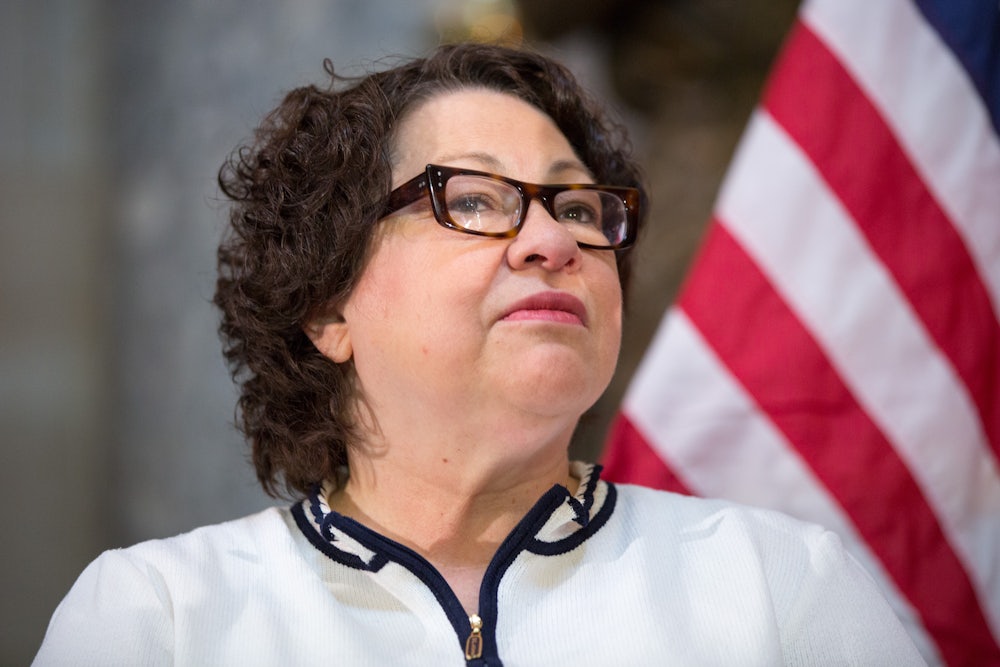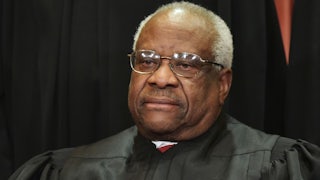The Sonia Sotomayor mini scandal vanished as quickly as a summer squall.
Last week the Associated Press, through a laborious examination of open records, revealed that staffers working for the Supreme Court justice had for years pressured public institutions to buy hundreds—and sometimes thousands—of copies of her books. Such mass purchases were often the implicit price of a speaking appearance by Sotomayor at a law school or a library. Partly as a result, Sotomayor has earned $3.7 million from her memoir of growing up in the Bronx and her four children’s books since she joined the court in 2009, including hundreds of thousands in royalties.
All of this is both legal and troubling.
Republicans should have been thrilled at an opportunity to lambaste a leading liberal voice on the Supreme Court—except for the awkward reality that Sotomayor’s missteps are nothing-burgers compared to the flagrant abuse of Supreme Court ethical standards by Clarence Thomas and Samuel Alito. In sharp contrast to Sotomayor’s book-based buckraking, the two Republican-appointed justices accepted lavish vacations from conservative billionaires Harlan Crow and Paul Singer and never disclosed them. As The New York Times put it in a recent investigative piece about Thomas’s transgressions, his bonds with megarich right-wingers “have brought him proximity to a lifestyle of unimaginable material privilege.”
Democrats ignored the Sotomayor story, with a few exceptions like Rhode Island Senator Sheldon Whitehouse, a crusader for Supreme Court ethics reform. The political logic is sadly predictable: Life is tough enough for the embattled liberal bloc on the Supreme Court without Democrats turning on Sotomayor for her aggressive pursuit of book royalties.
But the Sotomayor story shouldn’t be allowed to vanish down the memory hole, for reasons that go beyond highlighting lax ethical standards for the Supreme Court. In her own way, Sotomayor illustrates a bipartisan reality of life in Washington in the twenty-first century: It is no longer enough to be powerful. You also have to be rich.
Sotomayor is one of the highest-paid public officials in Washington, making $285,400 per year. The salary for a member of Congress, in contrast, is $174,000. Moreover, Supreme Court justices retire at full pay, which is a perk that is granted to virtually no one else in government or the private sector. When her abstemious predecessor David Souter retired from the court in 2009, law professor Orin Knox noted approvingly, “He is not looking to cash in, or write a book, or take another job.” As predicted, the now 83-year-old Souter has been living quietly in New Hampshire.
During her 14 years on the Supreme Court, Sotomayor has made about as much from her books as from her government salary. An unnamed source close to Sotomayor told the AP for its article that the justice’s autobiography, My Beloved World, has not made back even half of its $3.1 million advance. For that reason, the source said piously, Sotomayor “has not and will not profit from sales.” Thanks to her gargantuan advance (an example of the publishing world overpaying for books by political celebrities), Sotomayor has not received royalties from individual or bulk sales of her memoir, though she has received royalty payments from her children’s books.
None of this justifies the way that Sotomayor’s government-paid staff hustled My Beloved World when it was still plausible that the book could earn future royalties. Michigan State University spent $100,000 to buy the memoir, with copies sent to the Supreme Court for autographing, before Sotomayor spoke on campus in 2018. In advance of the justice’s appearance at a 2019 event in Portland, Oregon, promoting her children’s book Just Ask!, an anxious Supreme Court aide wrote to a local library, “Is there a reminder going out that people need to purchase a book at the event or bring a book to get into the signing line? Most of the registrants did not purchase books.”
Along with Sotomayor, Supreme Court justices produce enough books to rival a writer’s colony like Yaddo. It may reflect the languid pace of legal work at the Supreme Court. Or, more likely, it may have something to do with a $30,000 limit on outside earnings—aside from a book-related loophole. Over the years, Thomas has raked in $1 million from his bookish pursuits; Neil Gorsuch has brought in $900,000 since he joined the court in 2017. But that’s chump change compared to Amy Coney Barrett, who signed a $2 million book deal in 2021, shortly after she became Donald Trump’s third anti-abortion Supreme Court justice. The risible topic of Barrett’s still-unpublished literary work: how justices should keep their personal feelings out of their jurisprudence.
The old-time view (courtesy of late-nineteenth-century humorist Finley Peter Dunne) was that the Supreme Court follows the election returns. The contemporary version is that the Supreme Court follows the rest of Washington in its passion to be wealthy rather than merely comfortable. Once there was a trade-off under which many top officials in Washington chose power over money. Now virtually everyone in the upper ranks of government is asking themselves, “If I’m so smart, why aren’t I rich?”
A few emblematic moments from the 1950s illustrate how political life used to play out. In his Pulitzer Prize–winning biography of Harry Truman, David McCullough movingly describes the outgoing president getting on a train without Secret Service protection at Union Station after the 1953 inauguration of Dwight Eisenhower. “He had come home without salary or pension,” McCullough writes, adding that while Truman “had managed to put aside part of his $100,000 salary as President during his second term … it was in all probability a modest amount.” House Speaker Sam Rayburn, who had been in Congress since 1913, had virtually no life outside his legislative duties. Robert Caro in Master of the Senate, the third volume of his still-uncompleted Lyndon Johnson biography, depicts the spartan life of the unmarried Rayburn: “When the House wasn’t in session and other congressmen went home to their families, the Speaker went home to a small apartment near DuPont Circle.”
To be sure, sackcloth was not the dominant fashion statement in Washington in the 1950s. Lawyer-fixers like Tommy Corcoran and Clark Clifford had made the lucrative transition from the White House to the corridors of money. Johnson had prospered by snagging, along with his wife, Ladybird, lucrative Texas radio and television licenses. Eisenhower’s first Cabinet was dubbed “Eight Millionaires and a Plumber” in honor of union official Marty Durkin, who became secretary of labor.
But the dominant ethos through the 1970s was that service at the highest levels of government was rewarding enough to justify the financial trade-offs. That began to change during the greed-is-good years of Ronald Reagan’s presidency. Former Reagan adviser Michael Deaver was immortalized in a 1986 Time cover story on “Influence Peddling in Washington.” Time had nailed a trend that continues today: “Tempted by the staggering fees lobbyists can command, lawmakers and their aides are quitting in droves to cash in on their connections. For many, public service has become a mere internship for a lucrative career as a hired gun for special interests.”
The trick these days is to maximize your wealth while still serving in government. As usual, Congress offers a case study. The Campaign Legal Center found that during the early days of the pandemic in 2020, dozens of members of Congress in both parties actively traded stocks (many related to health care) after receiving Covid briefings. Yet despite the public outrage, bipartisan efforts to limit stock trading by senators and House members have generated more press releases than legislative action.
There will be those who argue that Sotomayor is entitled to earn as much as she can from her books since she has selflessly served on the federal bench since she was first confirmed as a district judge in 1992 under George H.W. Bush. But if money were Sotomayor’s prime motivation, she could have stepped down as a judge at any time and embarked on highly lucrative legal work. Sotomayor—like most of her fellow justices and so many other top government officials—wants to have it both ways. And that unwillingness to sacrifice remains a sad-eyed symbol of the erosion of public service in today’s Washington.


